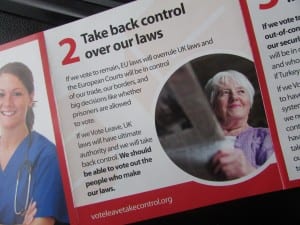 The most frustrating, but perhaps inevitable, feature of the EU referendum campaign is the wealth of ill-informed comment, and straightforward untruths, being disseminated by those campaigning. In some cases it is possible to argue that differences of opinion might lead to understandably different perspectives on the same issue. However, in other cases it is hard to avoid the conclusion that there has been a deliberate attempt to mislead.
The most frustrating, but perhaps inevitable, feature of the EU referendum campaign is the wealth of ill-informed comment, and straightforward untruths, being disseminated by those campaigning. In some cases it is possible to argue that differences of opinion might lead to understandably different perspectives on the same issue. However, in other cases it is hard to avoid the conclusion that there has been a deliberate attempt to mislead.
A case in point is the leaflet above which presents ‘5 positive reasons to Vote Leave and take back control’. Reason number 2 which is ‘to take back control of our laws’ includes the following carefully worded statement:
If we vote to remain, EU laws will overrule UK laws and the European Courts will be in control of our trade, our borders, and big decisions like whether prisoners are allowed to vote.
The obvious red herring here, which those campaigning to leave the EU well know, is that Britain’s membership of the EU has anything to do with prisoners’ voting rights. The leaflet is careful to state that this is something which is of concern to ‘European Courts’, however, what it fails to mention is that the court which ruled that UK prisoners’ rights had been breached by denying them a vote is the European Court of Human Rights, which is not a court of the European Union, and that withdrawal from the EU would not remove Britain’s obligations under the European Convention on Human Rights.
The European Court of Human Rights is an international court which was established in 1959 to uphold the European Convention on Human Rights. The 47 states which recognise the jurisdiction of the Court form the Council of Europe. These include all member states of the European Union, but also nineteen states which are not members of the EU including Russia, Switzerland and Turkey. Britain was a founding member of the Council of Europe, some fourteen years before it joined the European Community in 1973. It is perfectly possible, therefore, to be party to the ECHR without being a member of the EU.
It could, of course, be argued that leaving the EU would be a necessary precursor to withdrawal from the European Convention on Human Rights. However, this does not seem to be the case. While the European Convention provides the EU with a standard for the protection of human rights, which is an expectation for member states, there is no formal link between the ECHR and EU membership. Moreover, while there is now an expectation that states wishing to join the EU will sign up to the ECHR, the status of existing member states is somewhat different. As Steve Peers points out in his excellent post on this issue, historically there has been no requirement that existing member states sign up to the ECHR, France, for example, was not a party to the convention until the 1970s.
Of course all EU member states, including Britain, are now party to the convention and the central question is, therefore, whether Britain could withdraw from the ECHR and remain a member of the EU. This has been the subject of a number of authoritative studies including this House of Commons library note. In short there is no formal requirement that withdrawal from the ECHR would trigger withdrawal, or ejection, from the EU, and such a course of action seems unlikely in the extreme. EU member states do have to guarantee certain fundamental rights and values, which are embodied in the ECHR, which means it is not possible to jettison altogether respect for human rights. However, if Britain were, for example, to claim that these values were also embodied in a different framework, such as a British Bill of Rights, then there is no reason why its EU membership would be threatened by withdrawal from the ECHR.
Once interesting consequence of all of this is that while Britain could withdraw from the European Convention on Human Rights and remain a member of the EU, if Britain were to leave the EU and the ECHR, and then decided to reapply for EU membership, it would in all likelihood need to sign up to the convention before gaining readmission to the EU. At present Britain has the option of being a member of the EU and not a member of the Council of Europe, but that option only exists as long as Britain remains a member of the EU.
All of which is a roundabout way of making a number of simple points:
- The judgement on British prisoners’ voting rights did not emerge from an EU court.
- Withdrawal from the EU will not alter Britain’s obligations under the European Convention on Human Rights.
- Withdrawal from the EU is not necessary in order for Britain to withdraw from the European Convention on Human Rights.
